[ad_1]
Digital marketing is more important now than ever. Take steps to create, streamline, or optimize your marketing strategy today and accelerate your results in the coming year
Where do you start if you want to develop a digital marketing strategy? It’s still a common challenge since many businesses know how vital digital and mobile channels are today for acquiring and retaining customers. Yet they don’t have an integrated plan to support digital transformation and business growth, and engage their audiences effectively online.
If your business doesn’t have a strategic digital plan aligned with your business plan you will suffer from the ten problems I highlight later in this article and you will lose out to competitors who are more digitally savvy.
For each of the ten problems, I will also recommend marketing solutions and next steps to help you optimize your marketing strategy to win more customers in 2022.
What is digital marketing? The six pillars.
Digital marketing must support your marketing and business goals, so in my book – Digital Marketing: Strategy, Implementation and Practice – I define Digital marketing, also called online marketing, simply as:
Achieving marketing objectives through applying digital technologies and media.
This is the big picture which you need a strategy to support, but, as we explain on Smart Insights, to be successful in online marketing you also need mastery of the details to compete across the main digital platforms that consumers or businesses use to find and select products.
The algorithms used to power Facebook, Instagram, Google, LinkedIn and the publishers control your visibility and how much you pay, so to get visibility digital marketers need to get to grips with the latest techniques. It’s why my books on professional marketing run to over 500 pages, yet they can only touch on the best practices we detail on Smart Insights.
Before we review the different channels that make up digital marketing, it’s useful to simplify since business managers like the owners, finance or operations directors ultimately want to know what they need to invest in at a top level and the returns they will get. There will be a finite budget assigned to online marketing for the year and they want to ensure their team are spending time on the right activities and investing in the right types of media to get a positive return.
The six pillars comprising digital marketing
When training and consulting on digital strategy and as recommended in our free template, I recommend grouping digital activities in these six areas which each need someone responsible to manage them and improve results.
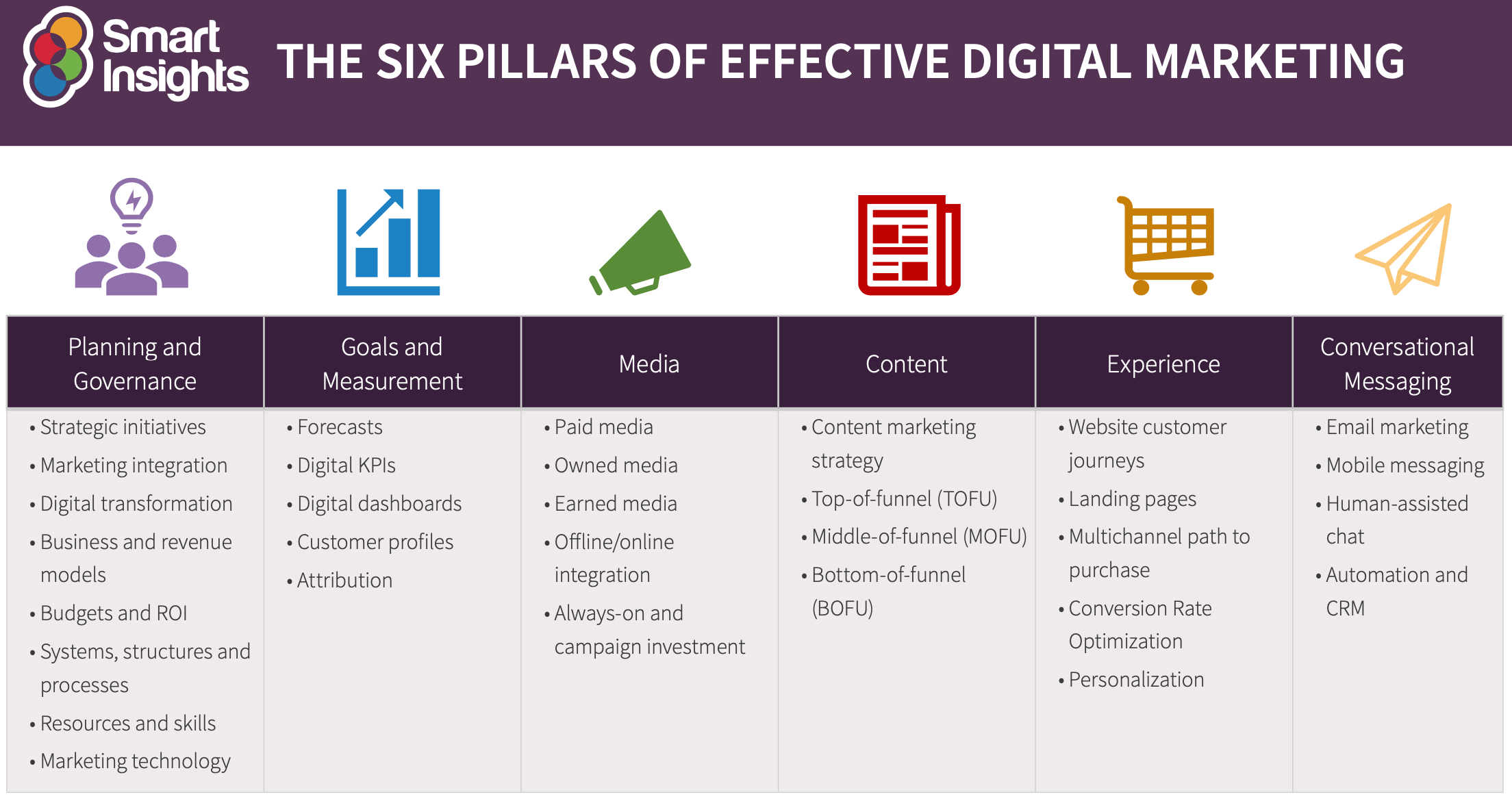
A focus on each of these is important regardless of the size of business. The pillars help show that success in digital marketing isn’t just about digital media and platforms, important as they are. Creating an effective digital experience, messaging and quality content to fuel your digital strategy are all vital too.
In smaller businesses, it may be one person such as a digital marketing manager responsible for all, or one for each pillar with many team members in larger businesses. The six pillars are:
- 1. Strategy and governance (or management): Goals – Analytics, Strategy (Segmentation, Targeting, Brand Positioning), integration, marketing and sales alignment, resourcing, structure, marketing technology and data
- 2. Goals and measurement: Forecasts, digital reporting including KPI dashboards, attribution and customer insight
- 3. Media: Paid, owned, earned media including Search, Social and Display ads
- 4. Experience: Desktop / mobile website and apps. Customer service.
- 5. Messaging: Email, Chat, Social media, customer service, on-site interactions and personalization
- 6. Content: Product and blog content to fuel content marketing, PDF downloads, Interactive tools
Our free digital marketing plan template has more details on the key decisions for each of these.
This simple division of digital best practices can also help students learn beyond the complexities of the different types. I have created this video to introduce these terms.
How does digital marketing differ for B2B and B2C marketing?
Many of the largest brands in the world today including the digital platforms like Facebook (Meta) and Google (Alphabet) are consumer brands, but when considering how best to use digital strategies, it’s important to consider business-to-business brands too. There are many B2B companies which often serve B2C brands.
Smart Insights developed our RACE Marketing planning framework so that it works equally in B2B and B2C markets. This is the case since it integrates your customers’ digital experiences interacting with brands across Reach, Act, Convert and Engage – the full customer journey.
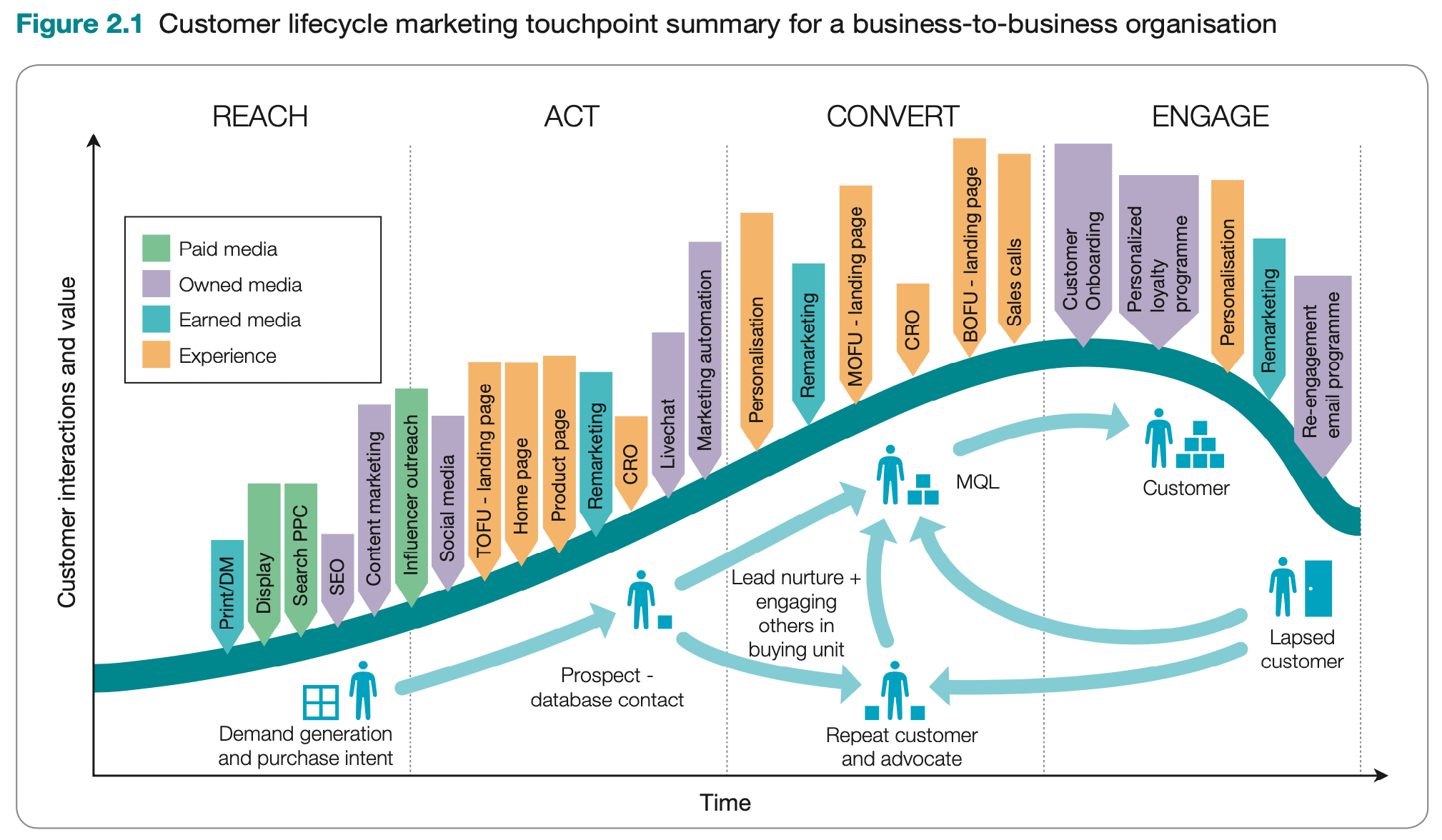
You can find out more about how to plan your marketing lifecycle across the RACE Framework with our free digital marketing plan template.
The 16 digital media activities forming digital marketing
As I’ve mentioned, success in digital marketing requires mastering the details.In my book I explain how these 16 examples of different types of marketing technologies span 6 digital media channels, plus a range of paid media, owned media and earned media options.
- Search engine marketing
- Social media marketing
- Digital advertising
- Digital PR
- Digital partnerships
- Digital messaging
- Pay-per-click PPC
- Paid social
- Programmatic display
- Online advertorial
- Affiliate marketing
- Publisher email/push
- Organic search (SEO)
- Organic social
- Native advertising
- Guest blogging
- Co-branding
- In-house email/push
- Backlinks
- Earned mentions
- Sponsorship
- Influencer outreach
- Co-marketing
- Partner emails
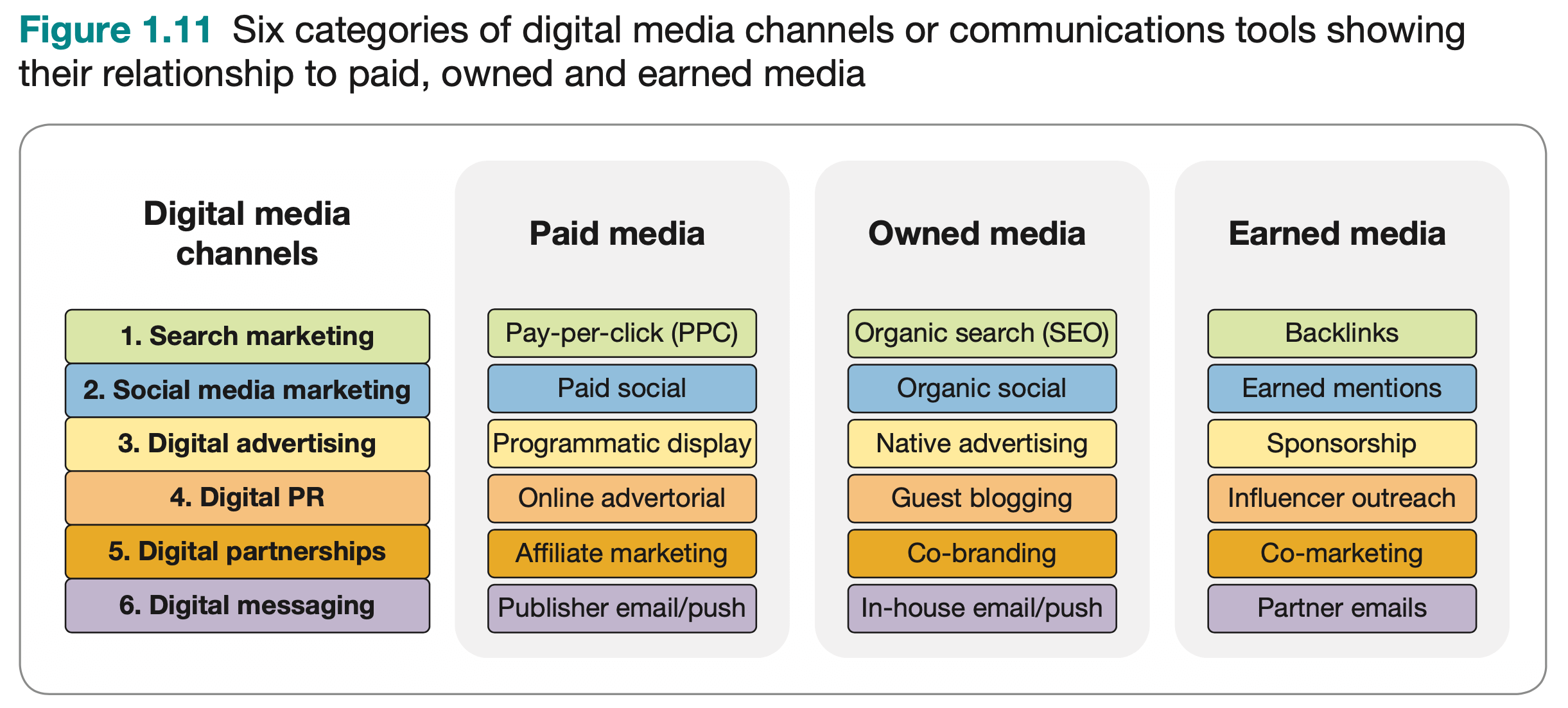
However, to be truly successful, digital techniques must also be integrated with traditional media such as print, TV, and direct mail as part of multichannel marketing communications. More importantly, now more than ever, you need to be able to demonstrate the value of your work.
The purpose of this article is to uncover 10 reasons why you need a digital marketing strategy, but you can read more about the 16 types of digital marketing techniques with more recommendations and examples in Dr. Dave Chaffey’s What is digital marketing?
How important is digital marketing today?
A simple measure of the importance of digital marketing is how much money is spent on digital media. The latest IAB research on Advertising Spend and Revenue shows that in the United States, over three-quarters of media budgets will be in digital media. We see similar figures from IABS in the UK and European, so this is happening globally.
The IAB also gives an indication of the budget breakdown into digital channels. This is useful since it suggests a mix of the type of marketing activities we should be investing in. Bear in mind though, that the IAB data is based on data from the largest publishers and platforms, so it is less representative of smaller businesses and underplays the importance of organic search (Search engine optimisation), Digital PR and influencer marketing. The data shows that, as we would expect social media marketing and search marketing are important digital marketing investments. Yet, the data also shows that digital display and digital video are significant. Remember, that this is more representative of spend by larger businesses who are now using these channels to replace investment in TV and print advertising.
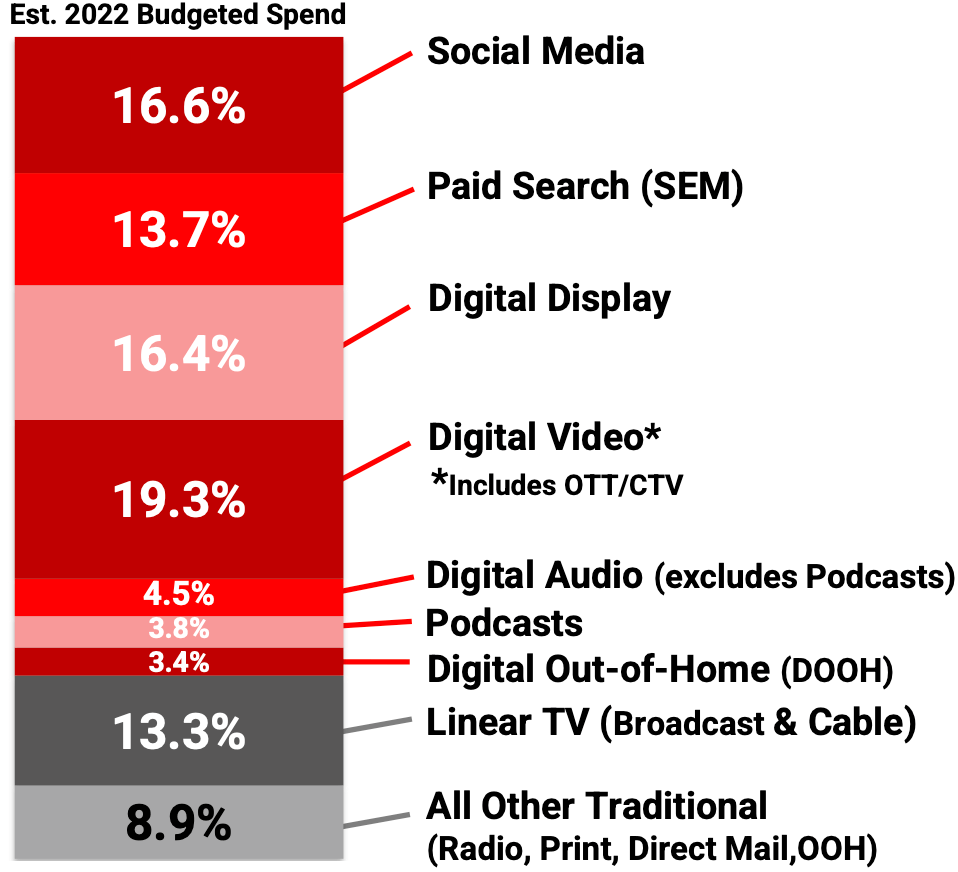
How will digital channels grow?
As discussed in the latest edition of my book, some have said we are living in a post-digital age since now digital marketing equals marketing, so it shouldn’t be considered separately from a strategic point of view. While the figures above support the contention that digital marketing is marketing, it’s dangerous to assume that digital marketing isn’t evolving and becoming even more important. The forecasts from the IAB show that digital marketing will continue to grow in importance over the next few years.
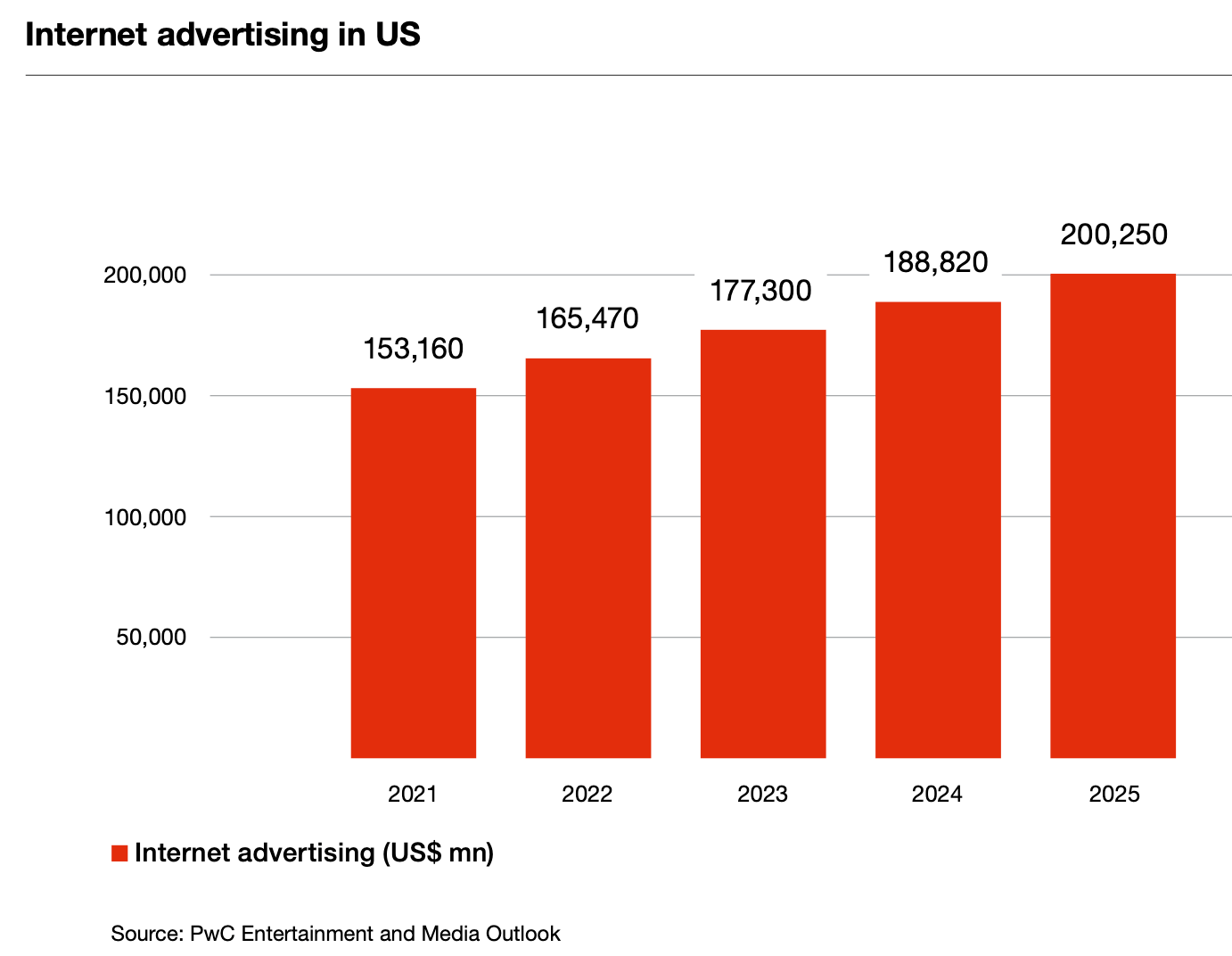
This makes it even more important to have a dedicated digital marketing strategy that is integrated and aligned with your marketing and business strategy to develop your digital maturity.
How important are jobs in digital marketing?
Another way to assess the importance of digital marketing today is to look at how many jobs are now in digital marketing. Recent research by LinkedIn of the changing marketing jobs landscape shows the importance of digital:
One in every two of the top marketing jobs listed on LinkedIn fall into the digital or media space.
The top fastest-growing roles of the past six months, from the highest to lowest rates of growth, are media coordinators, search managers, social media coordinators, search engine marketing managers, media managers, marketing analysts, email marketing specialists, search engine optimization analysts and digital media managers. LinkedIn reports that among other highly in-demand roles are digital account executives, social media managers, digital marketing managers, copywriters and digital strategists.
As the visual shows, the pandemic has seen the number of remote roles increase dramatically. Whereas just 2% of marketing roles were remote on March 1 2020, today nearly one in 10 are. At the time of the article, had seen a 177% increase in the number of remote job postings for marketing roles in the last six months.
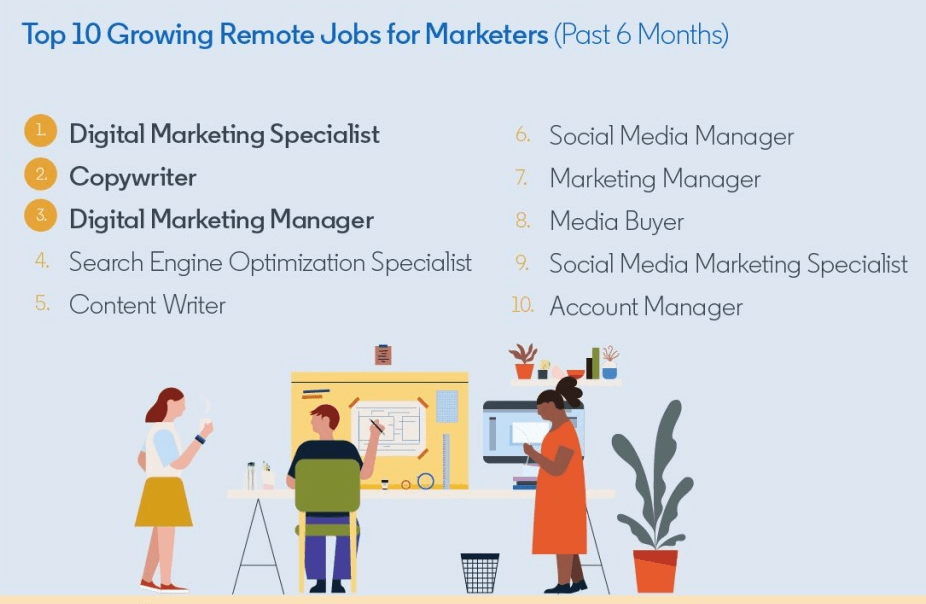
Digital strategy advice for businesses
Within each technique, there are lots of detailed tactics that are important to success. So, they need to be evaluated and prioritized. For example, dynamic content for email automation, website personalization to programmatic, retargeting, and skyscraper content for organic search.
Not sure where to begin? Access our dedicated marketing strategy solutions for Business Members to get your hands on all the tools you need to optimize your marketing strategy across 10 of the hottest marketing channels and strategies.
Whatever you’re looking for to take your next steps in digital optimization, Smart Insights has tools, training, and templates to support you in improving your skills and boosting your performance in a challenging landscape for marketers.
The challenges of digital marketing
In my experience, a common challenge is where to start drawing up your digital marketing plan. I think there is a fear that a massive report is required, but we believe that lean planning works best. That’s why all our Learning Paths are integrated across the RACE Framework, so you can create one integrated strategy.
Your plan doesn’t need to be a huge report, a strategy can best be summarized in two or three sides of A4 in a table linking digital strategies to SMART objectives within our OSA Framework – Opportunity, Strategy, Action. As a Business Member, we can support you to get it right the first time.
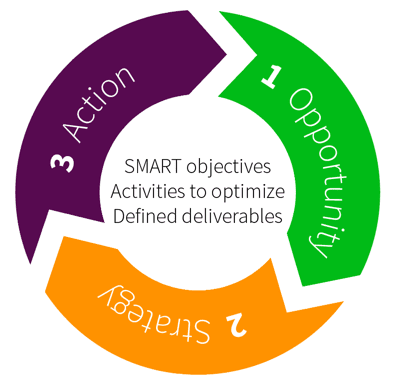
How does your digital marketing compare?
Our Managing Digital Marketing 2020 report found that that nearly half of companies don’t have a clearly defined digital marketing strategy. But of those who do, the majority have integrated it into the marketing strategy (the second step mentioned above).
Currently, about 12% are still using a separate digital document, which is the first step in the process towards a fully integrated strategy.
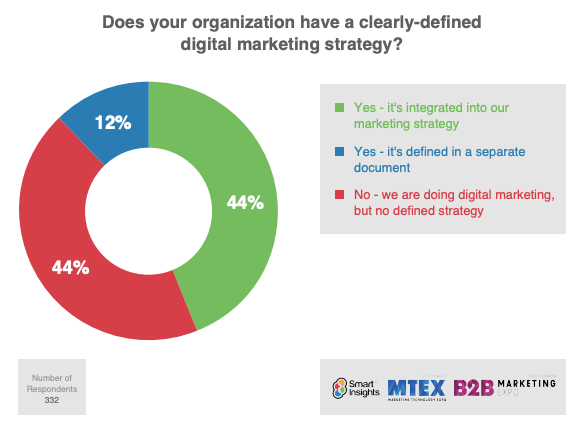
So, what are your next steps to fully optimizing your digital strategy?
I’m sure many of the companies in this category are using digital media effectively and they could certainly be getting great results from their search, email, or social media marketing.
But I’m equally sure that many are missing opportunities for better integration, or are suffering from the other challenges I’ve listed below. Perhaps the problems below are greatest for larger organizations that most urgently need governance.
From talking to marketers and business owners, I find the creation of digital plans often works best in two stages.
- First, a separate digital marketing plan is created. This is useful to get agreement and buy-in by showing the opportunities and problems. At this stage, you can map out a path by setting goals and specific strategies for digital.
- Second, digital becomes integrated into marketing strategy, it’s a core activity, “business-as-usual”. But, it doesn’t warrant separate planning, except for the tactics. This is the stage at which your integrated omnichannel marketing will be the most effective. This is the aim, and we can get you there.
All our marketing tools and templates are integrated across the RACE Framework. This renowned marketing structure is designed to empower managers and marketers with a clear, concise winning marketing strategy, to win more customers.
10 reasons why you may need a digital marketing strategy?
It’s important to be able to make the business case to invest more in digital marketing since, if you can’t convince yourself or your colleagues to invest, then the future of your business is in jeopardy. It’s simple, you won’t be able to compete to attract new customers in the future.
Incredibly, I originally suggested these 10 reasons to invest in digital marketing twenty years, ago, but they remain important so I have kept evolving approaches to develop digital strategies in line with the latest digital marketing trends.
So, if you don’t yet have a strategy, or maybe you want to review which business issues are important to include within a strategic review, we’ve set out the 10 most common problems, that in our experience arise if you don’t have a strategy.
1. You’re directionless
I find that companies without a digital strategy (and many that do) don’t have a clear strategic goal for what they want to achieve online in terms of gaining new customers or building deeper relationships with existing ones.
And if you don’t have goals with SMART digital marketing objectives you likely don’t put enough resources to reach the goals and you don’t evaluate through analytics whether you’re achieving those goals.
Our templates can support you to create more realistic forecasts of investing in digital media and improving conversion rates. Use our RACE digital marketing dashboard to simplify your reporting of Google Analytics goals for monthly reviews.
2. You won’t know your online audience or market share
Customer demand for online services may be underestimated if you haven’t researched this. Perhaps, more importantly, you won’t understand your online marketplace. The dynamics will be different from traditional channels with different types of customer profile and behaviour, competitors, propositions, and options for marketing communications.
Our templates include a customer persona guide and template to help you develop more detailed, realistic personas that map messages and content requirements through the customer journey.
We’ve got marketing tools to support your research and planning. Our popular competitor analysis module in our RACE Practical Digital Strategy Learning Path is packed with templates and matrixes to review the relative performance of your key competitors. Plus, find out more about your audience’s intent with our Google Keywords planning tools.
3. Existing and start-up competitors will gain market share through optimizing their always-on marketing
If you’re not devoting enough resources to digital, or you’re using an ad-hoc approach with no clearly defined strategies, then your competitors will eat your digital lunch!
Always-on marketing refers to the investments in paid, owned and earned media needed across the customer lifecycle shown in Figure 2.1. These are needed to maintain visibility and support conversion and retention continuously as people search for and select products online.
We recommend a 90-day planning approach (template) to prioritize your activities using the RACE growth process that identifies 25 key digital activities you should continuously refine by prioritizing those that matter most.
As a member of Smart Insights, we’ll also keep you updated on the latest trends and innovations in your sector. So you can stay ahead and not fall behind.
4. You don’t have a powerful online value proposition
As part of defining the scope of opportunity when using a strategic approach to digital marketing, it’s helpful to think about how digital experiences can improve your brand appeal. This involves improving online services, interactive tools and digital audience interactions to improve customer service.
A clearly defined digital value proposition tailored to your different target customer personas will help you differentiate your online service encouraging existing and new customers to engage initially and stay loyal.
5. You don’t know your online customers well enough
It’s often said that digital is the “most measurable medium ever”. But Google Analytics and similar will only tell you volumes of visits, not the sentiment of visitors, what they think. You need to use other forms of research and website user feedback tools to identify your weak points and then address them.
6. You’re not integrated (“disintegrated”)
It’s all too common for digital activities to be completed in silos whether that’s a specialist digital marketer, sitting in IT, or a separate digital agency. It’s easier that way to package ‘digital’ into a convenient chunk. But of course, it’s less effective. Everyone agrees that digital media work best when integrated with traditional media and response channels.
That’s why we recommend developing an integrated digital marketing strategy, so your digital marketing works hard for you! With your integrated plan in place, digital will become part of your marketing activity and part of business as usual.
7. Digital doesn’t have enough people/budget given its importance
Insufficient resources will be devoted to both planning and executing e-marketing. There is likely to be a lack of specific specialist e-marketing skills which will make it difficult to respond to competitive threats effectively.
As a Smart Insights Business Member, you’ll have access to strategy and planning tools including performance and digital maturity benchmarking, and regular marketing data reports, so you can keep track of your position in a competitive landscape.
Advanced Module

Making the business case for investment in digital marketing
Part of the Managing digital marketing transformation Toolkit
Learn how to justify increased investment in digital marketing
Learn More
8. You’re wasting money and time through duplication
Even if you do have sufficient resources, they may be wasted. This is particularly the case in larger companies where you see different parts of the marketing organization purchasing different tools or using different agencies for performing similar online marketing tasks.
That’s why you need to invest in a marketing strategy that works for you and your team, to plan, manage and optimize your digital channels and platforms. Drive the marketing results you need to achieve your business objectives, and boost your marketing ROI.
9. You’re not agile enough to catch up or stay ahead
If you look at the top online brands like Amazon, Booking.com, Dell, Google and Zappos, they’re all dynamic – trialing new approaches to gain or keep their online audiences.
Our 90-day RACE Growth system approach will support you to create a similar process to improve your results.
10. You’re not optimizing
Every company with a website will have analytics. But many senior managers don’t ensure that their teams make or have the time to review and act on them. Once your digital channel strategy enables you to get the basics right, then you can progress to the continuous improvement of the key aspects like brand building, site user experience, and lead nurturing.
Transform your marketing strategy and accelerate your results today with Smart Insights
So, the good news is that there are powerful reasons for creating a digital strategy and transforming your marketing, which you can use to persuade your colleagues and clients.
If you’re looking to integrate your marketing strategy, Smart Insights membership is a no-brainer. We have options to suit small and large businesses, plus consultants, agencies, and individuals, so you can enhance your skills and grow your business.
Apply the RACE Framework to your marketing strategy today to see your results rocket. Our tried-and-tested marketing structure has been proven to boost growth for businesses investing in digital marketing to reach their goals. If you have any questions about membership, or just want to find out more about what’s on offer, why not book a consultation?
Don’t forget, Smart Insights members can use our digital benchmarking tools to track your progress from initial to optimized. You can identify where you need to improve by downloading free benchmarking templates like this for different digital activities as part of free membership.
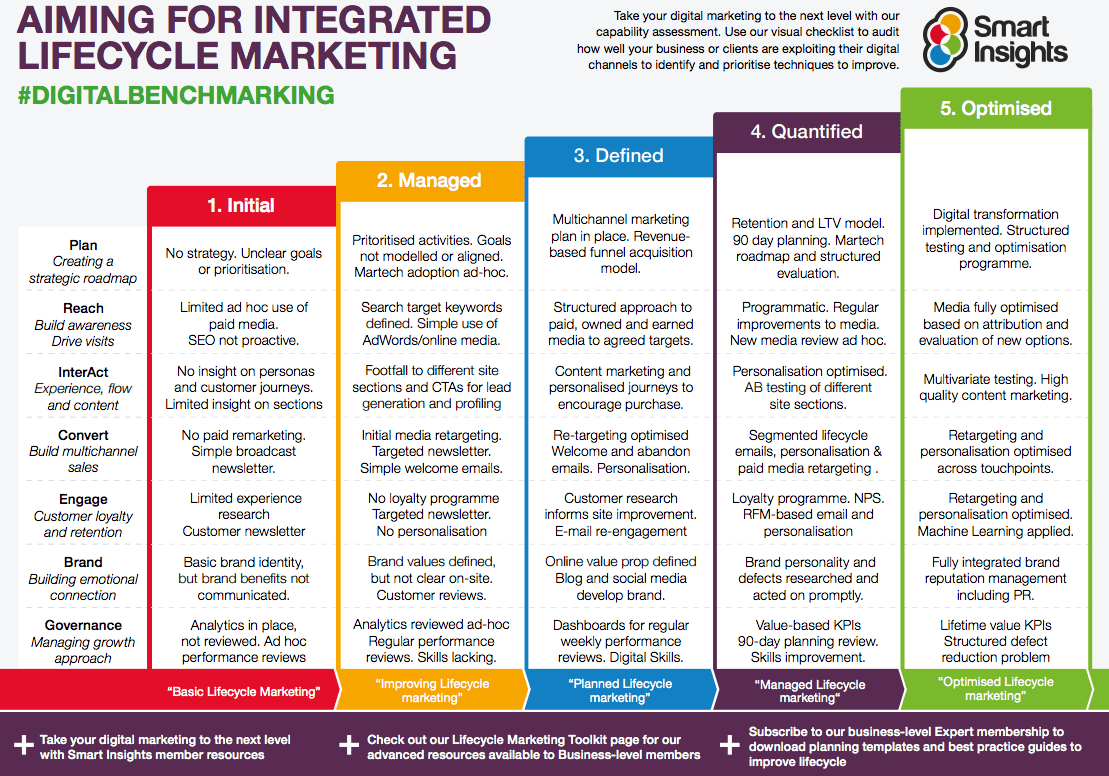
[ad_2]
Source link

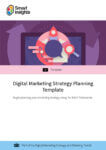




More Stories
Dated Kitchen Features That Homebuyers Notice
Shake the fridge Shakshuka using up leftovers
Italian Meatloaf – Once Upon a Chef